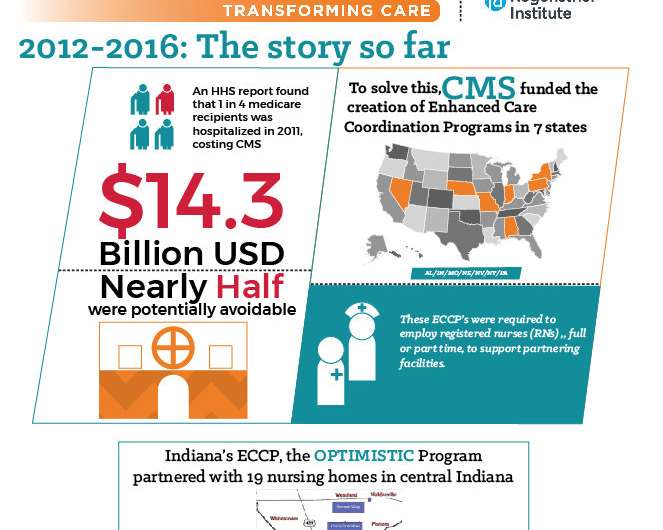OPTIMISTIC lowers long-stay nursing home residents' avoidable hospitalizations by a third

The initial phase of OPTIMISTIC, an innovative program developed and implemented by clinician-researchers from the Indiana University Center for Aging Research and partners to decrease avoidable hospitalizations of long-stay nursing facility residents, reduced these events a striking 33 percent, according to an independent evaluation prepared at the request of the Center for Medicare and Medicaid Innovation which funds the OPTIMISTIC study.
The evaluation also found that nearly one in five of all hospitalizations—both avoidable and unavoidable—was eliminated by OPTIMISTIC.
By lowering Medicare expenditures $1589 per nursing home resident per year, OPTIMISITC produced a total Medicare spending reduction of nearly $13.5 million and a net savings of over $3.4 million from 2014 to 2016.
OPTIMISTIC, an acronym for Optimizing Patient Transfers, Impacting Medical quality and Improving Symptoms: Transforming Institutional Care, is one of seven demonstration projects funded across the country by CMS Innovations through the Initiative to Reduce Avoidable Hospitalizations among Nursing Facility Residents through placing additional resources in nursing homes. OPTIMISTIC was among the projects with the strongest performance.
OPTIMISTIC's four-year initial phase focused on enhanced clinical care. Nurses and nurse practitioners were embedded in 19 central Indiana nursing homes providing direct support to long-stay residents and their families as well as education and training to facility staff. These specially trained health professionals also led care management reviews of long-stay patients to optimize chronic disease management, reduce unnecessary medications and clarify care goals.
"Long-stay nursing home residents typically have high rates of multiple chronic illnesses including dementia," said IU Center for Aging Research and Regenstrief Institute scientist Kathleen Unroe, MD, MHA, co-principal investigator of OPTIMISTIC's first phase. "Keeping these complex patients in the nursing facility is often the right choice. There is a lot of care we can provide in the nursing facility setting—a familiar place with staff and providers who know them—that spares the resident and their family the difficulties associated with a transfer to a hospital. When we can do that safely we should."
The care of long-term nursing home residents with these conditions is often fragmented by hospitalizations and re-hospitalizations which is especially burdensome to frail older adults. The likelihood of reduced functioning and overall negative impact on their health after discharge from the hospital is significant.
"This independent evaluation confirms that OPTIMISTIC is really a "home run" improving quality of care, reducing burdensome transfers, and saving money at the same time," said Chief of IU School of Medicine's Division of General Internal Medicine and Geriatrics Greg Sachs, MD. Dr. Sachs, also an IU Center for Aging Research and Regenstrief Institute scientist and co-principal investigator of the first phase of OPTIMISTIC, indicated that the team is eager to find ways to spread the OPTIMISTIC clinical model.
OPTIMISTIC has received more than $30 million in total funding from CMS.
"We are excited both by the results of the independent evaluation and by the fact that we have three years remaining on this project to continue to build on our successes in Phase 1 with an expanded group of partners across the state," Dr. Unroe, a geriatrician, said. She is the principal investigator of OPTIMISTIC's second phase which allows nursing homes to access financial reimbursement through Medicare for care of long-stay nursing homes residents in place.















